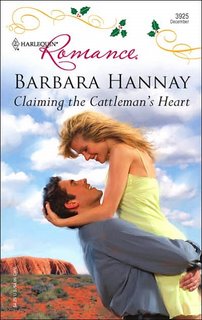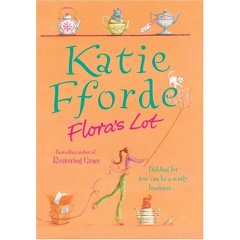We're going home today and I was checking files on my Alphasmart and found this old piece of writing that I thought I'd share with you. It was written on a plane flight to America a couple of years ago...
“How long will you be out of the country?” asks the girl who stamps my passport in Cairns.
“Twelve days,” I tell her.
“Business?”
"A conference.”
Her nose wrinkles in sympathy. ”That won’t be much fun.”
“This conference will be.”
“Conferences are never fun, are they?”
“They are when you’re a romance writer.”
She has difficulty hiding her surprise as she takes another, longer look at me. Obviously I don’t fit her image of how a romance writer should look, but she checks my name and asks if it’s the name I use for writing and I suspect she’s a romance reader.
Perhaps she’s another of the faceless millions of women who feel the need to hide their reading habit in the closet.
On the plane I read the
Weekend Australian and in the
Review section two articles grab my attention. In one I read that 17 million people in America have stopped reading over the past decade and in another I read a discussion of Juliet Flesch’s book
“From Australia with Love” in which a journalist tells us that 175 million readers around the world read romance and then implies not quite subtly that it’s a pity these poor people don’t have something better to do. She goes on to state openly that it’s also a pity that an academic like Juliet Flesch paid so much attention to romance writers and their genre.
Also during this flight I watch the French Canadian film,
The Barbarian Invasions. I watched it twice because it was so good and because I wanted to take in the subtle layers. And among the many messages, there is one that isn’t lost on me – the fact that in many people’s minds, the predictability and lightness of romance books is the reason they are lumped with other Barbarian tastes.
Tales that embrace love and have happy endings and are written for women have been by many regarded as the dregs of literature.
During a stopover in Tokyo, I read another article about the decline of reading in the Japan Times. One cause suggested by George Will (writing from Washington) is that: “This surely has something to do with the depredations of higher education: Professors lusting after tenure and prestige, teach that the great works of the Western canon, properly deconstructed, are not explorations of the human spirit but mere reflections of power relations and social pathologies.”
I find myself cheering: “Exactly!!”
And I am beginning to see a pattern. The quickest way to turn readers off reading is to take away their pleasure or to deny that reading can be fun. Let them turn to television for pleasure. Reading is serious work!!!!
As an English teacher in the 1990s I had to pass on these theories about the ‘death of the author’, ‘reader response’ and the need to deconstruct every text, especially popular texts, to my students. I know I’m sentimental. I love nothing better than to wallow in deep emotions as I read and it bothered me immensely that it was no longer appropriate to enjoy a novel. Every book was a social construct.
In the midst of dissecting popular fiction with one of my eleventh grade classes, I was required to read Mills and Boon.
This was my first encounter. And for me it was a road to Damascus experience. Instead of lambasting these books for their predictable plots, their stereotypical characters and questionable middle class values, I was fascinated by what lay at the core of these novels. I recognized in them the same things I loved in the classic girls books I’d read in my childhood – the Anne of Green Gables series, Little Women and Seven Little Australians – two fascinating characters, who were obviously meant for each other, but who were kept apart by inner conflicts and external pressures, until that final “a-ahhh” moment, when they declare their love!!!!
And so here I was, a decade later, a romance writer, on my way to join fellow devotees of popular romantic fiction in Dallas, Texas. At the conference we would sign books at an event devoted raising funds for adult literacy.
But the numbers of readers are still dropping. Unless one of us can find a way to write Harry Potter for adults, I fear it may be too late.
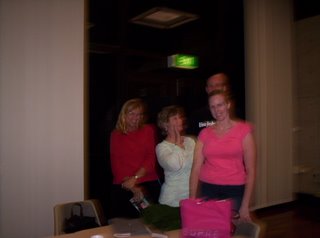
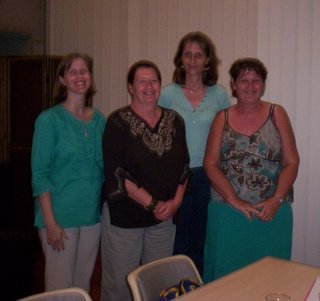
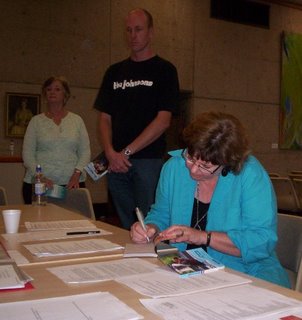 Barb signing books (an author's favourite guilty pleasure) at the end of a big day.
Barb signing books (an author's favourite guilty pleasure) at the end of a big day.


